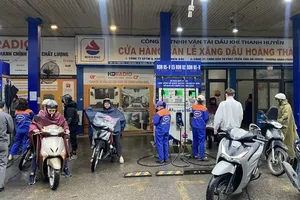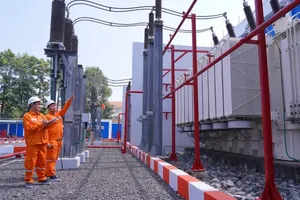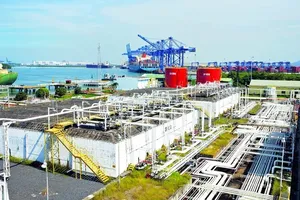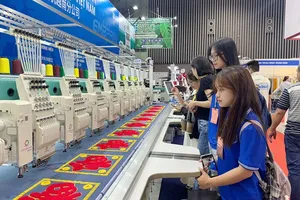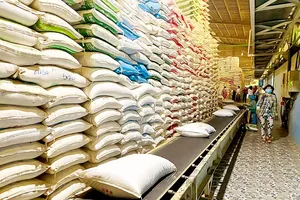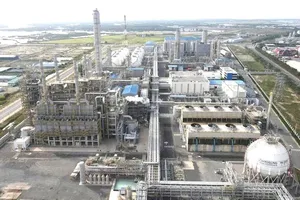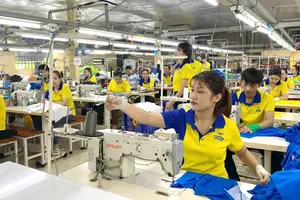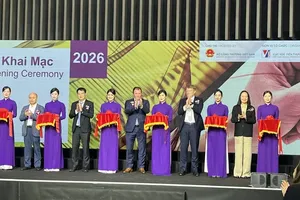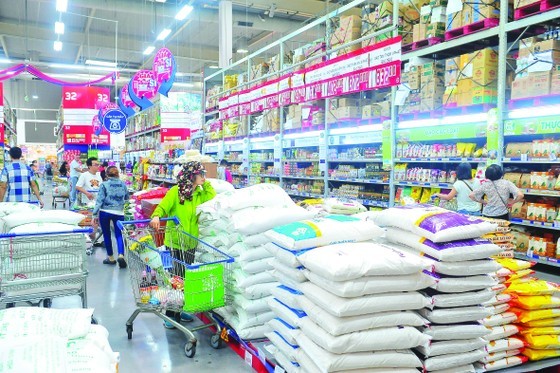 |
Consumers buy rice at a supermarket in Thu Duc City. |
Stores raise prices while supermarkets provide discounts
At different rice-selling establishments along To Hien Thanh Street near Hoa Hung Market in District 10, Ho Chi Minh City, there are visible price lists for various rice varieties, such as fragrant Thai at VND18,000 per kilogram, Bui Sua rice at VND18,000 per kilogram, and Tai Nguyen Long An rice at VND18,500 per kilogram...
A rice seller mentioned that slightly over a week ago, rice suppliers increased prices by VND500 to VND3,500 per kilogram, depending on the rice variety. Similar price changes were observed in other rice stores. Conversely, rice sold through established distribution channels not only maintained stability but also underwent a noteworthy decrease, coupled with promotional campaigns.
At Co.opmart Cong Quynh supermarket in District 1, HCMC, a wide range of rice varieties is prominently displayed with noticeable discount labels, making it convenient for customers to identify. For instance, customers purchasing the 2nd, 4th, and 6th items between August 10 and August 23 can enjoy discounts on Co.op Finest’s ST24 rice, marked down from VND149,000 per 5kg bag to VND89,000 per bag, and Co.op Finest’s ST25 rice, reduced from VND189,000 per 5kg bag to VND99,000 per bag. Various other discounts are applicable from August 10 to August 23, including Co.op Select’s Nang Hoa rice, originally priced at VND110,000 per 5kg bag, now offered at VND89,000 per bag; Co.op Select’s Jasmine rice, initially priced at VND128,000 per 7kg bag, now reduced to VND118,000 per bag.
A spokesperson from Co.opmart supermarket revealed that, on average, the store maintains a monthly rice reserve of 1,270 tons, which expands to 1,800 tons during the three months of the Lunar New Year. Besides the involvement of the Wilmar and Tan Vuong brands in stabilization efforts, Co.op Happy's rice is offered at an equally competitive price despite not being part of the stabilization program. If market conditions fluctuate, supermarkets and suppliers will continue to collaborate in order to stabilize and lower selling prices to share with consumers.
Likewise, representatives from GO! and Big C supermarkets have confirmed that their operations regarding rice products remain unchanged, with no notable changes in purchasing volume. Additionally, rice suppliers have all reiterated their dedication to prioritizing the domestic market.
Farmers advised against selling young paddy
In the Mekong Delta region, as rice prices rise, not only businesses and farmers but intermediaries also become quite active. With the allure of favorable rice prices, numerous farmers decide to sell their young paddy. A notable area of three-crop rice fields (ready for harvest every 90-100 days), which was just 30 days old, has already been sold to intermediaries by farmers. However, not every farmer finds complete contentment after receiving deposits.
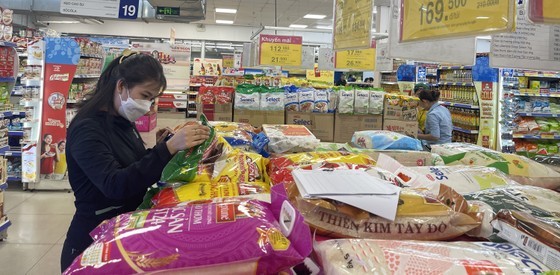 |
Customers buy rice at Co.opmart Cong Quynh in District 1. |
Nguyen Van Nhu, a farmer in Chau Thanh A District, Hau Giang Province, exemplifies this situation. Nhu expressed his disappointment, sharing that at the start of August, he received a deposit of VND6 million for 2 hectares of rice at a selling price of VND6,700 per kg. However, just over ten days later, the market price of rice surged to VND7,000 per kg.
In light of the situation where farmers are hurriedly selling their young paddy, local authorities, and agricultural departments across different Mekong Delta provinces have intensified their efforts to disseminate information and ask farmers to calm down. They emphasize the importance of allowing the rice to fully mature before selling during harvest time to mitigate potential risks.
Mrs. Pham Thi Minh Hieu, Head of the Plant Production and Plant Protection Division under the Department of Agriculture and Rural Development of Can Tho City, offers guidance that farmers should refrain from hastily planting excessive quantities of rice and rushing through cultivation practices with the aim of maximizing yields and capitalizing on high-price periods. Such practices could result in an over-application of nitrogen fertilizers, leading to plant diseases and diminished rice grain quality. This scenario would create opportunities for traders and intermediaries to manipulate prices, consequently giving rise to various adverse outcomes and subsequent complications.
According to Mr. Do Ha Nam, Vice Chairman of the Vietnam Food Association, the surge in retail rice prices can be traced back to the rise in paddy prices, which have gone up from approximately VND6,000 to VND8,000 per kilogram. In the previous period, traders bought paddy at high rates for export purposes. However, at the present moment, the rice export market has experienced a slowdown, prompting traders to accumulate stocks and subsequently increase prices for retailers. This situation could be seen as a speculative phenomenon, given that Vietnam recently enjoyed a successful rice harvest, eliminating any potential rice shortage.
During a conversation with SGGP Newspaper, Mr. Nguyen Nguyen Phuong, Deputy Director of the Department of Industry and Trade of HCMC, shared that presently, some suppliers have suggested a 10 percent rice price increase to supermarkets, yet the distribution systems have not granted approval to this proposal. Moreover, businesses engaged in stabilizing the rice supply for the market are upholding price stability. To ensure stability in the rice market, the department has collaborated with the Department of Finance, Thu Duc City, and districts in actively monitoring market trends and rice prices in the region. The department has issued official notifications mandating primary rice export enterprises to conform to regulations concerning commodity rice and paddy procurement, thereby ensuring a harmonious balance between exports and domestic consumption. Specifically, rice price-stabilizing enterprises in HCMC are obligated to adhere to commitments outlined in the market stabilization program. They are also expected to proactively strategize for procurement and reserves and ensure ample supply, surpassing the registered quantities under all circumstances.
Professor Dr. VO TONG XUAN, Honorary Principal of Can Tho University: Staying composed during market volatility
Vietnamese rice has garnered global recognition for a long time. Vietnamese businesses should leverage this opportunity to expand the reach of Vietnamese rice grains. Furthermore, this presents a chance for enterprises and farmers to enhance their connections, facilitating the production of rice products that adhere to export standards and boast high quality and competitive pricing. This establishes a prerequisite for farmers and businesses to augment their earnings while aligning the benefits from rice products.
This unfolding scenario will present lots of challenges for numerous businesses: those who had previously signed contracts at lower prices now find themselves procuring rice at higher costs, which, coupled with the rapid escalation in rice prices, makes acquiring substantial quantities challenging. Now, more than ever, it is crucial for businesses, farmers, local authorities, and the agricultural sector to maintain composure and react adeptly to the market, thereby asserting the position of the Vietnamese rice brand on the path to export.
